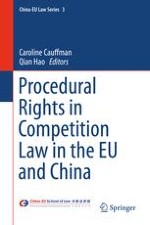2016 | OriginalPaper | Buchkapitel
Procedural Rights in Competition Law Proceedings: Ex Post Proceedings
verfasst von : Ling Dong
Erschienen in: Procedural Rights in Competition Law in the EU and China
Verlag: Springer Berlin Heidelberg
Aktivieren Sie unsere intelligente Suche, um passende Fachinhalte oder Patente zu finden.
Wählen Sie Textabschnitte aus um mit Künstlicher Intelligenz passenden Patente zu finden. powered by
Markieren Sie Textabschnitte, um KI-gestützt weitere passende Inhalte zu finden. powered by
